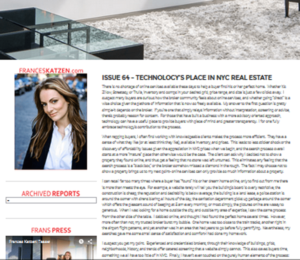There is no shortage of online services available these days to help a buyer find his or her perfect home. Whether it’s Zillow, Streetasy, or Trulia, inventory and comps in your desired grid, price range, and size is just a few clicks away. I suspect many buyers are curious how the broker community feels about online services, and whether going “direct” is a wise choice given the plethora of information that is now so freely available. My answer to the first question is pretty simple-it depends on the broker. If you’re one that simply relays information without interpretation, screening or advice, there’s probably reason for concern. For those that have built a business with a more advisory oriented approach, technology can have a useful place to provide buyers with piece of mind and greater transparency. I for one fully embrace technology’s contribution to the process.
When repping buyers, I often find working with knowledgeable clients makes the process more efficient. They have a sense of what they like (or at least think they like), available inventory, and prices. This leads to less sticker shock or the discovery of affordability issues given the appreciation in NYC prices when we begin, and the search process overall starts at a more “mature” place than otherwise would be the case. The client can ask why I decided not to show a property they found online, and thus get a feeling that no stone was left unturned. This eliminates any feeling that the search process is a “black box,” or the broker somehow missed a diamond in the rough. The fact I may choose not to show a property brings us to my next point- online services can only provide so much information about a property.
I can recall far too many times where a buyer has “found” his or her dream home online, only to find out from me there is more than meets the eye. For example, a website rarely will tell you the building’s board is overly restrictive, the construction is cheap, the reputation and desirability is below average, the building is a land lease, a police station is around the corner with sirens blaring all hours of the day, the sanitation department picks up garbage around the corner which offers the pleasant sound of beeping at 5 am every morning, or most simply, the pictures online are waaay to generous. When I was looking for a home outside the city, and outside my area of expertise, I saw the same process from the other side of the table. I dabbled online, and thought I had found the perfect home several times. However, more often than not, my trusted broker burst my bubble. One home was too close to the train tracks, another right in the airport flight patterns, and yet another was in an area that had years to go before fully gentrifying. Nevertheless, my searches gave me some small sense of satisfaction and comfort-I had done my homework.
I suspect you get my point. Experienced and credentialed brokers, through their knowledge of buildings, grids, neighborhoods, history, and trends offer catered screening that a website simply cannot. This also saves buyers time, something we all have too little of in NYC. Finally, I haven’t even touched on the purely human elements of the process: advice on negotiating tactics, dealing with the seller’s broker, renovation costs where applicable and the expected pro forma apartment value appreciation, recommended service providers such as mortgage writers and legal representation, and hounding the attorneys to make sure everything goes smoothly from contract to close. For those real estate attorneys’ reading this that have worked on behalf of my clients, I suspect you’ll corroborate my last point (sorry)!
In summary, my personal view is brokers and technology can and should coexist. There is a valuable place for both when looking for an apartment, and every buyer deserves the best of both services when searching for something so important-your family’s future home.

